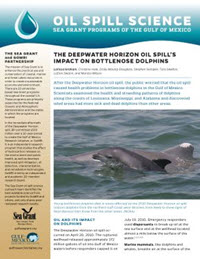After the Deepwater Horizon oil spill, the public worried that the oil spill caused health problems in bottlenose dolphins in the Gulf of Mexico. Scientists examined the health and stranding patterns of dolphins along the coasts of Louisiana, Mississippi, and Alabama and discovered oiled areas had more sick and dead dolphins than other areas.
OIL AND ITS IMPACT ON DOLPHINS
The Deepwater Horizon oil spill occurred on April 20, 2010. The ruptured wellhead released approximately 172 million gallons of oil into Gulf of Mexico waters before responders capped it on July 19, 2010. Emergency responders used dispersants to break up oil at the sea surface and at the wellhead located almost a mile below the surface of the water
Marine mammals, like dolphins and whales, breathe air at the surface of the 2 water where oil slicks form during spills. The oil and its vapors can irritate and damage their airways and lungs. Marine mammals may also be exposed to oil by eating contaminated prey or ingesting oil from the water or sediments when feeding.
Factsheet by: Larissa Graham, Christine Hale, Emily Maung-Douglass, Stephen Sempier, Tara Skelton, LaDon Swann, and Monica Wilson
This work was made possible in part by a grant from the Gulf of Mexico Research Initiative, and in part by the Sea Grant programs of Texas, Louisiana, Florida, and Mississippi-Alabama. The statements, findings, conclusions, and recommendations do not necessarily reflect the views of these organizations.

